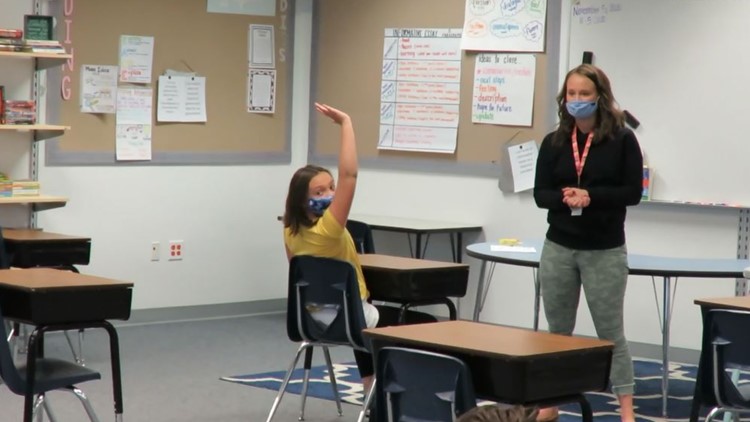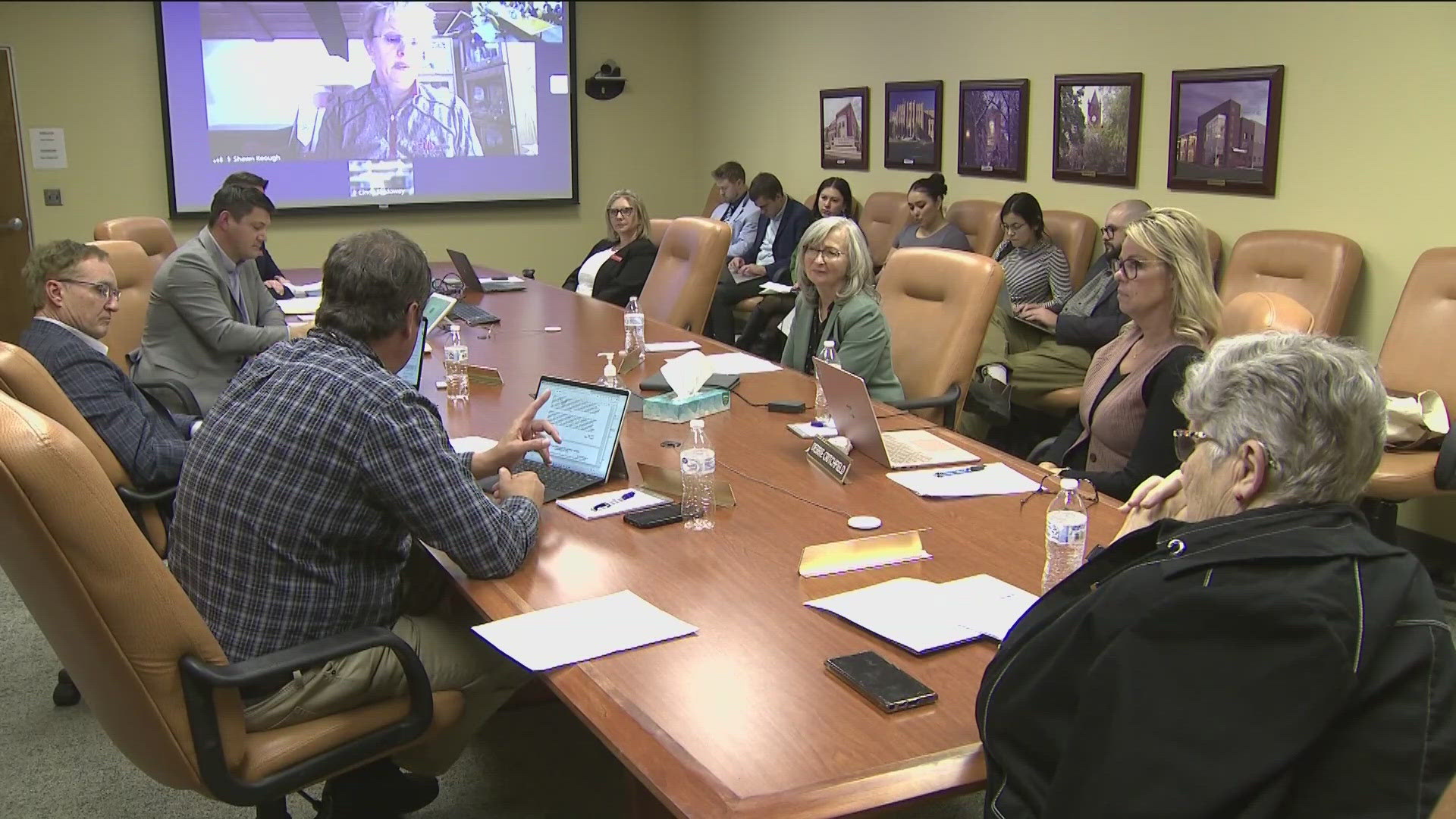BOISE, Idaho — As new COVID-19 infections around the state continue to surge and more schools make the difficult decision to move back to an online-only curriculum, leaders in education issued a joint plea for residents of the state to follow coronavirus restrictions in order to protect students, teachers, and the rest of the community.
The statement was issued Friday and signed by State Superintendent of Public Instruction Sherri Ybarra, Idaho State Board of Education President Debbie Critchfield, Idaho Public Charter School Commission Chairman Alan Reed, Idaho Association of School Administrators Executive Director Andy Grover and Idaho School Boards Association Executive Director Karen Echeverria.
The group stressed their preference to have students attend school in-person, but warned that doing so will be in jeopardy if adults in the community ignore their responsibility to limit the virus' spread.
"The quickest and most effective way to mitigate this virulent spread is simply to follow the science-based public health protocols of washing hands, maintaining six feet apart and wearing a face mask," the statement reads. "Adult behaviors do impact our ability to operate schools."
Public health officials have repeatedly said transmission of COVID-19 is by large not happening in school settings. Instead, new cases are being contracted out in the community at gatherings and in spaces where people are not wearing masks.
Idaho Gov. Brad Little ordered Idaho rolled back to Stage 2 last week citing climbing cases and the risk of overwhelming hospitals and health workers, but stopped short of ordering a mask mandate, business closures, or travel restrictions.
Ybarra, Critchfield, Reed, Grover and Echeverria wrote that residents need to follow the science when making decisions.
"Idaho's confirmed cases are on a perilous trajectory. As education policy leaders, we urge and plead with communities large and small across Idaho to do their part to help our students be able to stay in school," the statement reads. "The pandemic is not partisan. Enabling our students to go to school, with all the developmental and extracurricular opportunities it has to offer, is not partisan either. It is a moral and economic imperative."
The group also asked for understanding from the public regarding decisions made at the local levels by school boards who are working hard to protect students and meet the community's needs with the most up-to-date information available to them at the time.
"Members of these local boards are volunteers, your neighbors, who signed up to help make a difference for schools in their community, not to manage a pandemic," the statement reads. "It's challenging to work through issues without the space our private businesses have to explore ideas and solutions without immediate, visceral public scrutiny. They are doing their best under incredibly challenging circumstances."
The statement is included in its entirety below.
November 20, 2020
Joint Statement from Idaho Education Leaders
The pandemic has impacted almost every aspect of how we live, work, recreate and celebrate. From mundane tasks to once-in-a-lifetime events to medical emergencies, our engagement has been drastically changed.
Our students and educators are no exception. Their lives were turned upside down last spring when they were sent home to finish out their education in virtual environments. The spring high school and intercollegiate sports season was cut short, which was devastating for student athletes. High school graduations and college commencement ceremonies were cancelled en masse. The list of missed opportunities goes on.
While the summer provided our schools, colleges and universities with some time to prepare for dramatically different instructional delivery and learning environments, educators and policymakers alike are deeply concerned about learning loss due to the disruptive paradigm shift.
Our top priority is to provide students the opportunity to be in school as much as is safely possible. For most students and families, in-person learning is preferred, and we know that extracurricular activities are vitally important to students and play an important role in developing the whole person. We can't fulfill this critical responsibility for our youth unless we can keep our students and educators healthy and safe.
We are advised and consistently reminded that schools are not the problem. Dr. Deborah Birx, United States Coronavirus Response Coordinator and Ambassador-at-Large, recently paid a visit to Idaho. In a meeting with state and local leaders she stated that public schools are not ground zero for virus transmission. In other words, schools are not "super spreaders."
Dr. Birx explained that the highest concentration of viral spread is happening in our communities. Gatherings where people are not maintaining adequate physical distancing and not wearing masks are the super spreaders.
The quickest and most effective way to mitigate this virulent spread is simply to follow the science-based public health protocols of washing hands, maintaining six feet apart and wearing a face mask. Adult behaviors do impact our ability to operate schools.
Idaho's confirmed cases are on a perilous trajectory. As education policy leaders, we urge and plead with communities large and small across Idaho to do their part to help our students be able to stay in school. The pandemic is not partisan. Enabling our students to go to school, with all the developmental and extracurricular opportunities it has to offer, is not partisan either. It is a moral and economic imperative.
We understand that we are living in a highly politically charged and polarized environment. We don't always get policy decisions right the first time, but we continually seek appropriate solutions and decisions. Even with the benefit of hindsight, there are no easy solutions to managing our way through this public health crisis. We want readers to remember and understand that every decision the State Board of Education and local school boards make are done in public meetings, with the best information available at the time. Members of these local boards are volunteers, your neighbors, who signed up to help make a difference for schools in their community, not to manage a pandemic. It's challenging to work through issues without the space our private businesses have to explore ideas and solutions without immediate, visceral public scrutiny. They are doing their best under incredibly challenging circumstances.
Finally, like you, we all have COVID fatigue. And like you, we have all experienced disappointment, grief, loss or fear to some degree as a result of this awful virus. We ask for your patience, kindness and spirit of cooperation as we work toward our mutual goals. We are doing our best to limit the spread of COVID-19 for public health and to preserve children's access to the full schooling experience. Please join us in doing everything you can to stop this pandemic.
Debbie Critchfield, President, Idaho State Board of Education
Sherri Ybarra, State Superintendent of Public Instruction, Idaho State Department of Education
Alan Reed, Chairman, Idaho Public Charter School Commission
Andy Grover, Executive Director, Idaho Association of School Administrators
Karen Echeverria, Executive Director, Idaho School Boards Association
At KTVB, we’re focusing our news coverage on the facts and not the fear around the virus. To see our full coverage, visit our coronavirus section, here: www.ktvb.com/coronavirus.
Facts not fear: More on coronavirus
See our latest updates in our YouTube playlist:



